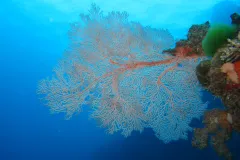What We're Reading 10/21

We’re more than halfway through October! Take a break from jumping into crunchy piles of leaves and check out what’s happening in the ocean world.
The Future of Animal Observation?
Only recently has drone technology become cheap and accessible enough to reach the general public. Drones have made national news, from a drone owner famously landing his device on the White House lawn in 2015 to drones that make much-needed blood deliveries in Rwanda. The scientific community is also capitalizing on this new tech trend by turning drones into an unlikely research tool. Last week, Smithsonian.com published a feature article on the game-changing use of drones as windows into extremely difficult questions that scientists may not have been otherwise able to address. Researchers are using aerial technology to track coastal erosion, map coral reefs and even give whales a breathalyzer test.
A New Reality?
A suite of recent hurricanes brewing in the Atlantic, including deadly Hurricane Matthew, has reignited the dialogue about coastal flooding and sea level rise. Once entirely theoretical, major inundations have been documented in the United States punctuated by failing storm water drainage and extensive property and infrastructure damage. “It’s not a hundred years off- it’s now,” warns William V. Sweet, a scientist with the National Oceanic and Atmospheric Administration. In many cases, this new reality has mobilized local civic leaders across the political spectrum to create detailed climate plans; however, gridlock in US Congress has prevented the United States from adopting a board national policy on sea-level rise.
Too Soon for Obituaries
Earlier this month, rumors swirled around the Internet that the Great Barrier Reef had “passed away after a long illness.” Likely inspired by a series of reports released several months prior revealing that the reef had undergone a massive bleaching event, Outside Magazine actually wrote an obituary for the UNESCO World Heritage Site. But according to a recent Los Angeles Times article, the “community of scientists that study coral reefs in the Pacific ocean would like you to hold up, slow down and take a deep breath.” Kim Cobb, a professor at Georgia Tech’s School of Earth and Atmospheric Sciences believes that there are certainly reasons for concern, but also for hope. “It’s not too late for the Great Barrier Reef, and people who think that have a really profound misconception about what we know and don’t know about coral resilience,” says Cobb.

